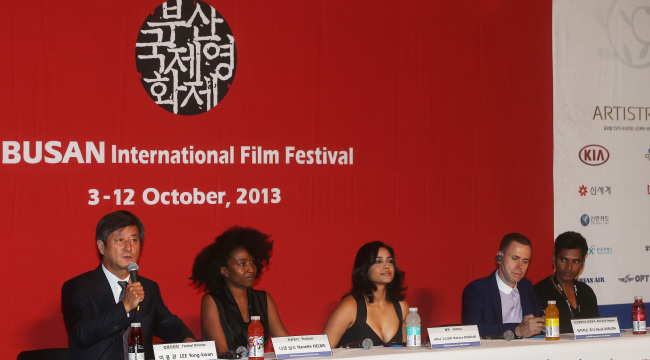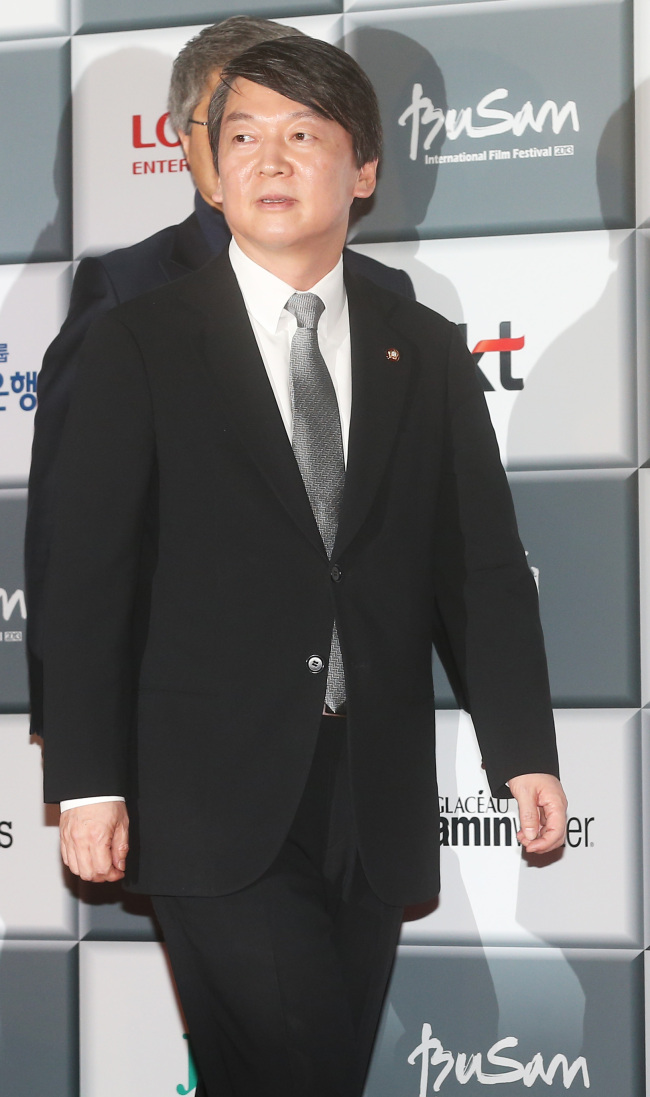Bhutanese film on Indian traditional dance opens BIFF
Korea’s biggest film festival to screen 301 films from 70 countries
 |
|
Actors and actresses attend the opening ceremony of Busan International Film Festival, Thursday. (Yonhap News) |
BUSAN― A Bhutanese film directed by a Buddhist monk, featuring India’s traditional dance and its spirituality, opened the 18th Busan International Film Festival in Busan on Thursday.
Cohosted by veteran Korean actress Kang Soo-yeon and Hong Kong singer and actor Aaron Kwok, the festival’s opening ceremony was attended by some 4,000 guests, including renowned cineastes from home and abroad such as Japanese filmmaker Shinji Aoyama, French film critic and historian Charles Tesson, and Korean filmmakers Chung Ji-young and Kim Ki-duk.
 |
|
Hong Kong actor Aaron Kwok (left) hosts the festival's opening ceremony along with South Korean actress Kang Soo-yeon. (Yonhap News) |
 |
Korean actress Hwang Woo Seung-yae
(Yonhap News) |
Directed by Khyentse Norbu, the opening film, titled “Vara: A Blessing,” tells the story of a young woman named Lila (played by Indian actress Shahana Goswami), who lives in rural India with her “Devadasi” mother, who works as a temple dancer married to a Hindu god.
Lila, who aspires to become a dancer like her mother, falls in love with a low-caste village boy, an aspiring sculptor named Shyam (played by actor Devesh Ranjan), while mastering the traditional, spiritual Bharatanatyam dance.
The young woman, who had been devoted to serving the Hindu god, starts to fantasize that Shyam is Lord Krishna as their romantic relationship deepens.
The film’s screening marked the first time for a non-Korean and non-Chinese film to open the Busan International Film Festival.
“My film is about devotion, imagination, and also the power of belief,” director and Buddhist monk Norbu said in English in a video footage sent from Bhutan. He was unable to attend the opening ceremony of the festival as he is currently occupied with his religious training.
 |
|
From left: Lee Yong-kwan, director of the Busan International Film Festival, producer Nanette Nelms, Indian actress Shahana Goswami and Indian actor Devesh Ranjan (far right) attend a press conference on BIFF’s opening film “Vara: A Blessing” in Haeundae, Busan, Thursday. (Yonhap News) |
“It’s also a film about strength of women. I’ve always been an admirer of Indian classical dance. I hope that at least the film will act as a medium to introduce the vast and infinite and deep culture of India and its people and especially the classical dance. And at the same time also give a glimpse of an element of India that is seen through a non-Indian (artist).”
Although directed by a Bhutanese filmmaker, the film is an international production, according to one of the film’s producers, Nanette Nelms. Nelms herself worked as a contemporary dancer in New York and as a dance coach to Bjork for Lars von Trier’s 2000 Danish musical drama “Dancer in the Dark” before working with Norbu.
“It is based on an Indian short story and shot in Sri Lanka. We had technicians from Asia and America and producers from America and India, so it’s an international project,” she said during a press conference held prior to the opening ceremony on Thursday.
“And the audience that we are marketing the film towards is anyone and everyone who we can share this story with. It was not made with an intention to show just before any specific territory or audience. It really is a universal story that can be understood and resonate with a lot of people.”
Indian actress Shahana Goswami, who trained to be a classical Indian dancer before turning to an acting career, played the young Lila in the emotionally rich opening film.
“It was nice to experience that element of childhood again because there were a lot of similarities between Lila and how I was when I was much younger, such as talking to God as if (he or she) is my friend, dancing around, being a tomboy, being scolded by your parents for not doing the right thing,” the actress told reporters.
“So all that was very similar to the childhood that I had. More importantly, the person who I think has the most amount of Lila inside him is our director. He is like a child. He is as young, as vibrant and hopeful as Lila is. I think he helped me a lot in getting the essence of the character.”
When asked about what it was like to work with a director who is also a religious figure, Goswami said Norbu is just a “special person.”
“I don’t know if he is unusual because he is a monk or if he would be unusual as a director without being a monk,” she said.
“To me, it was really great to work with someone who has such a fantastic mind. It’s not just him being someone who guides people with his philosophy of life. It is because he has certain sensitivity to people and human beings and emotions which made him really delightful for me as an actress. He is one of the most charismatic people I’ve ever met.”
Producer Nelms said there is a lot of Bollywood influence in Bhutanese cinema, and Norbu, whom she describes as “the father of Bhutanese cinema,” is concerned that Bhutanese filmmakers may not be able to establish their own artistic voice. Norbu’s “The Cup” (1999) was the first film shot in Bhutan, according to Nelms.
“Even though India is a big influence, there is still a way to reflect your own identity is what Norbu wanted to tell (filmmakers) in Bhutan,” she said.
Celebrated Cambodian director Rithy Panh was given the festival’s prestigious Asian Filmmaker of the Year award during the opening ceremony.
The 49-year-old filmmaker, whose works have largely focused on the aftermath of the genocidal Khmer Rouge regime in his home country, won the Un Certain Regard award at this year’s Cannes International Film Festival for his latest work, “The Missing Picture.”
 |
|
Actress Hong Soo-a (Yonhap News) |
 |
|
Rep. Ahn Cheol-soo (Yonhap News) |
Meanwhile, French movie critic and historian Charles Tesson received the Korea Cinema Award in recognition of his lifetime achievements in introducing Korean cinema to an international audience during the opening ceremony as well.
A total of 301 films, including 95 world premieres, from 70 countries will be screened during the current edition.
This year’s BIFF runs until Oct. 12 at Busan Cinema Center and six other venues in the city. For this year’s full lineup and ticket information, visit www.biff.kr.
By Claire Lee (dyc@heraldcorp.com)